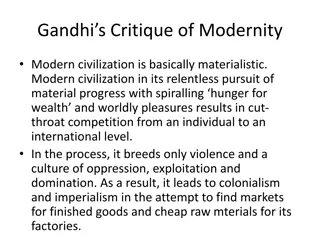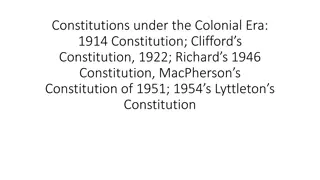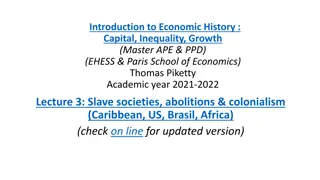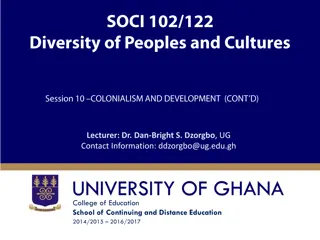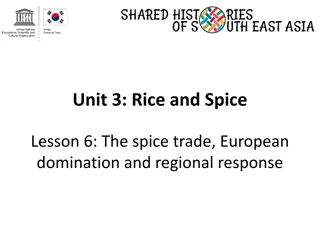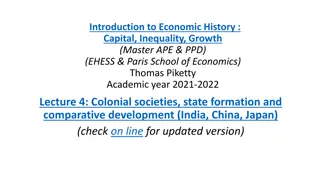Reflections on Colonialism and Cultural Domination
The texts by Jean-Paul Sartre and Frantz Fanon provide deep insights into the dynamics of colonialism and cultural imperialism. Sartre discusses the manipulation of native elites by European powers, while Fanon delves into the psychological impacts on colonized individuals. Both authors highlight how colonial powers sought to control not just economic wealth, but also the mental and cultural spheres of the colonized peoples. The intricate web of power, control, and resistance in colonial contexts is explored with poignant clarity.
Download Presentation

Please find below an Image/Link to download the presentation.
The content on the website is provided AS IS for your information and personal use only. It may not be sold, licensed, or shared on other websites without obtaining consent from the author.If you encounter any issues during the download, it is possible that the publisher has removed the file from their server.
You are allowed to download the files provided on this website for personal or commercial use, subject to the condition that they are used lawfully. All files are the property of their respective owners.
The content on the website is provided AS IS for your information and personal use only. It may not be sold, licensed, or shared on other websites without obtaining consent from the author.
E N D
Presentation Transcript
Not so very long ago, the earth numbered two thousand million inhabitants: five hundred million men, and one thousand five hundred million natives. The former had the Word; the others had the use of it. Between the two there were hired kinglets, overlords and a bourgeoisie, sham from beginning to end, which served as go-betweens. In the colonies the truth stood naked, but the citizens of the mother country preferred it with clothes on: the native had to love them, something in the way mothers are loved. The European lite undertook to manufacture a native lite. They picked out promising adolescents; they branded them, as with a red-hot iron, with the principles of western culture, they stuffed their mouths full with high- sounding phrases, grand glutinous words that stuck to the teeth. After a short stay in the mother country they were sent home, whitewashed. These walking lies had nothing left to say to their brothers; they only echoed. From Paris, from London, from Amsterdam we would utter the words Parthenon! Brotherhood! and somewhere in Africa or Asia lips would open ... thenon! ... therhood! It was the golden age. Jean-Paul Sartre
[I]n certain psychoses the hallucinated person, tired of always being insulted by his demon, one fine day starts hearing the voice of an angel who pays him compliments; but the jeers don t stop for all that; only from then on, they alternate with congratulations. This is a defence, but it is also the end of the story; the self is disassociated, and the patient heads for madness. Let us add, for certain other carefully selected unfortunates, that other witchery : Western culture. If I were them, you may say, I'd prefer my mumbo-jumbo to their Acropolis. Very good: you ve grasped the situation. But not altogether, because you aren t them or not yet. Otherwise you would know that they can t choose; they must have both. Two worlds: that makes two bewitchings; they dance all night and at dawn they crowd into the churches to hear mass; each day the split widens. Our enemy betrays his brothers and becomes our accomplice; his brothers do the same thing. The status of native is a nervous condition introduced and maintained by the settler among colonized people with their consent . Jean-Paul Sartre
[N]ot only must the black man be black; he must be black in relation to the white man. Some critics will take it on themselves to remind us that this proposition has a converse. I say that this is false. The black man has no ontological resistance in the eyes of the white man. Overnight the Negro has been given two frames of reference within which he has had to place himself. His metaphysics, or, less pretentiously, his customs and the sources on which they were based, were wiped out because they were in conflict with a civilization that he did not know and that imposed itself on him . Frantz Fanon, Black Skin, White Masks
The real aim of colonialism was to control the peoples wealth: what they produced, how they produced it, and how it was distributed; to control, in other words, the entire realm of the language of real life. Colonialism imposed its control of the social production of wealth through military conquest and subsequent political dictatorship. But its most important area of domination was the mental universe of the colonised, the control, through culture, of how people perceived themselves and their relationship to the world. Economic and political control can never be complete or effective without mental control. To control a people s culture is to control their tools of self-definition in relationship to others. For colonialism this involved two aspects of the same process: the destruction or the deliberate undervaluing of a people s culture, their art, dances, religions, history, geography, education, orature and literature, and the conscious elevation of the language of the coloniser. The domination of a people s language by the languages of the colonising nations was crucial to the domination of the mental universe of the colonised. Ngugi wa Thiong o, Decolonising the Mind
They talk to me about progress, about achievements, diseases cured, improved standards of living. I am talking about societies drained of their essence, cultures trampled underfoot, institutions undermined, lands confiscated, religions smashed, magnificent artistic creations destroyed, extraordinary possibilities wiped out. They throw facts at my head, statistics, mileages of roads, canals, and railroad tracks. I am talking about thousands of men sacrificed to the Congo- Oc an. I am talking about those who, as I write this, are digging the harbor of Abidjan by hand. I am talking about millions of men torn from their gods, their land, their habits, their life from life, from the dance, from wisdom Aime C saire, Discourse on Colonialism
Thomas Mapfumo, Chikonzero ( The Reason Why ) https://www.youtube.com/watch?v=AO627BzBG6U
Stella Chiweshe, Mutambazve https://www.youtube.com/watch?v=klO53XOcJJo
Your family did not always live here, did not move to this place until after the time that I was married to your grandfather. We lived up in Chipinge, where the soil is ripe and your great-grandfather was a rich man in the currency of those days, having many fat head of cattle, large fields and four wives who worked hard to produce bountiful harvests. All this he could exchange for cloth and beads and axes and a gun, even a gun, from the traders. They did not come to stay in those days; they passed through and left
The women were pleased with me when they came to prepare supper. You are quite a little worker, they said. All that is left is to prepare the sadza. Their praise made me feel better. It made me feel good. My confidence returned: Nyasha would not, I was sure, be able to prepare such a fine stew, certainly not at an open hearth. The idea made me feel so superior, so wholesome and earthy, like home- baked cornbread instead of the insubstantial loaves you buy in the shops, that I helped to cook the sadza as well. We did this outside in large drums, using sticks as thick as my arm for stirring. Chatting to aunts and cousins as we waited for the sadza to thicken, pouring in more mealie-meal when it had, I stopped feeling excluded and, since I no longer had need of them, my feelings of superiority disappeared as well. Exclusion held dreadful horrors for me at that time because it suggested superfluity. Exclusion whispered that my existence was not necessary, making me no more than an unfortunate by-product of some inexorable natural process. Or else it mocked that the process had gone wrong and produced me instead of another Nhamo, another Chido, another Babamukuru-to-be. I often felt superfluous in those days, but there in the camaraderie of the cooking, it was comfortable to occupy the corner that that same natural process had carved out for me. I was comfortable to occupy the corner that that same natural process had carved out for me. It was comfortable to recognize myself as solid, utilitarian me.
[We sat], I feeling bad for her and thinking how dreadfully familiar that scene had been, with Babamukuru condemning Nyasha to whoredom, making her a victim of her own femaleness, just as I had felt victimised at home in the days when Nhamo went to school and I grew my maize. The victimisation, I saw, was universal. It didn t depend on povery, on lack of education or on tradition. It didn t depend on any of the things I had thought it depended on. Men took it everywhere with them. Even heroes like Babamukuru did it. And that was the problem [W]hat I didn t like was the way all the conflicts came back to this question of femaleness. Femaleness as opposed to and inferior to maleness .
Makosi today, w/ Tsitsi Dangarembga https://www.youtube.com/watch?v=lVre1FUbrk4



